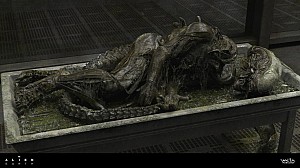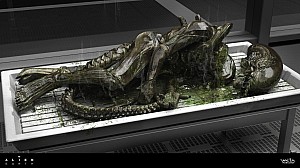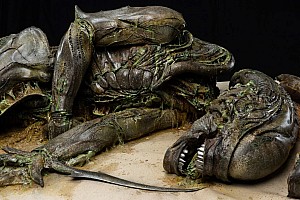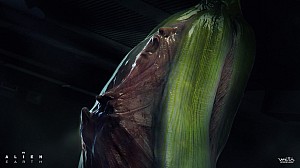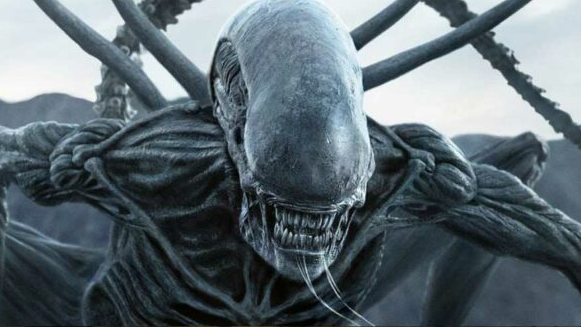My Review of Prometheus - condemnedmovies
Prometheus Forum Topic

Lucretio
MemberOvomorphJun 10, 2012979 Views3 RepliesHello everyone. I know exactly what you want to do is waste your time reading yet another review of Prometheus by an Alien fan. Folks, I am here to deliver. If you like it, or if you hate it and think I'm a stupid prick, either way you can enjoy some of my other reviews at condemnedmovies.wordpress.com. My review of Prometheus there has hyperlinks not included in the copied text below, as well as recent reviews of the original Alien trilogy (yes, I said trilogy). All the best.
----------
Prometheus – Art 3/5 Ent 6/5 Worth 5/5
Holding my breath since the late 1980s to finally see a decent Alien movie in theaters, I can testify that the wait is over. No film has come as close to coloring my imagination as the first two Alien movies, so the depressing let-down of Alien 3 and the Joss Whedon abomination Alien Resurrection both put a damper on my world. By the time the gloriously stupid Alien vs. Predator and its hate crime sequel came out, I had become more cynical than Diogenes. But lingering in the dark vastness of possibility, where no one can hear you scream, was the low frequency chatter – going all the way back to 1997 internet rumors – that somehow, some day, one or both of Ridley Scott and James Cameron were going to do Alien 5. And now that it’s here? I’m waiting for the other shoe to drop and have a chestburster pop out of me, because I must be dreaming.
Because this film is hardly as deep as people might think and want it to be, and therefore is overly reliant on the surprise of the first viewing and not as much on any eternal complexity demanding revisits, I should give a stern warning that much of what follows will spoil the experience, unless you’ve seen it already or don’t give a shit. The film begins with a pale humanoid being dropped off in a shockingly gorgeous waterfall by his ship, and commits a sacred ritual suicide by ingesting a black ooze that incinerates his body, but takes hold of his DNA to ostensibly spore radically variant life forms on this planet we’re to believe could be earth, or could be any one of the many goldilocks planets in the universe. After discovering many ancient and pre-historic paintings indicating a Chariots of the Gods influence on human development with a star constellation invisible to ancient people, scientist Noomi Rapace embarks on a mission to trace back the star maps to the habitable satellite within them, in an attempt to meet our supposed creator.
The journey opens with an android named David (the Alien films all have androids, named sequentially in alphabetical order), played by Michael Fassbender, spending most of his time learning prehistoric languages in order to attempt conversation with the alien beings if encountered, and watching Lawrence of Arabia. The film and character are particular obsessions of his creator, Peter Weyland (founder of the “fucking corporation” in the Alien series). This becomes more clear if we look at the promotional viral video set at a TED conference almost 7 decades prior to the events of Prometheus. The relation might have little to chew on, but T.E. Lawrence’s god complex of granting freedom and democracy to the Arabs is ever present in Weyland, and especially in relation to David, who is made slightly in the image of Peter O’Toole, and almost certainly has developed a conscience that is awkwardly both good and evil. David may just be an android, but he’s a cheeky android who spies on the dreams of Noomi Rapace while she’s cryogenically frozen, and stirs the pot directly at the expense of many people’s lives.
Once they spot alien structures on the moon (“God doesn’t build in straight lines”), they set down and begin exploring a massive dome (leftover designs from H.R. Giger’s work on the 1979 film). One thing leads to another, or rather one thing is pushed by David to another, until finally we discover that this isn’t an alien civilization, but the Los Alamos testing grounds for an extremely advanced biological instrument (the black ooze we see in the beginning) that deals both death and life in the form of extremely variant mutated species. It can destroy your genetic structure, it can zombify you into a superhuman freak, it can bloat worms into cobras, but it can also spread out into the DNA of everything from grass and mushrooms to wombats. Of course, we get to see the uglier creative destruction involved in this substance, otherwise what’s the point of having a horror movie?
Though the film is laden with cliches from the Alien movies, from Science Fiction at large, and even the works of Ridley Scott, it’s a breath of beautifully fresh air in that the narrative is more or less free of cliches at the choke points of expectation and plot devices. The story feeds off no antecedent that I can think of, because it extends far beyond Chariots of the Gods, and suggests these supersized pale humanoids designed not only us, but all of life on earth, going back billions of years. The crux of the argument between these guys and us seems to be that they’re worried about their own creation for some reason. It’s as if things got too real for them, as things get too real with the android for us at times, in a mise en abyme of creation and disappointing godliness. The traction it does have with cliches, however, I like to think of as training-wheel cliches, some of which we also saw in Cameron’s more subliminal return to the Alien series in 2009′s Avatar.
Here are some examples:
1. The Chariots of the Gods thing actually feeds off the first Alien vs. Predator.
2. We’ve got the cryotubes that are less baroque or symbolic, and more futurist now, but now we’ve got better science data on the human effects of deep space travel.
3. We’ve got the female heroine of Noomi Rapace in Sigourney Weaver’s place, maintaining Ripley’s vulnerability, impregnation and underwear shots, and thankfully eschewing the “badass chick” Vasquez cliche from Aliens often conflated with Ripley.
4. We’ve got certain quotes in the score that steal directly from Alien, and even the nuclear alarm at the end of Alien is quoted as a sound effect constantly.
5. We’ve got the sinister corporation that constantly fails at harnessing the extremities of nature. The amorality is mostly happenstance in Alien as Ian Holm takes programmed directions to capture the Alien, but more presently frank and devious in the person of Paul Reiser in Aliens, and outright crony capitalist and monopolistic in Alien 3. Here it’s just mindlessly going through the motions of cliched shadowy elites with delusions of grandeur.
6. We’ve got the fear of technology trope in David, that was present in Ian Holm’s Ash, but disappeared in Lance Henriksen’s Bishop, because it had been exhausted by the ’80s, notably by James Cameron himself in his previous Terminator.
7. We’ve got the “last survivor of the __”, used numerous times in Alien lore.
8. The plot returns to an essential Sci-Fi question: are humans naturally a dangerous and threatening species, to the point that our pale humanoid creators would want to destroy us and try again out of fear?
9. Finally, we’re met with a constant Ridley cliche of innocent morsels of inquisitive agnostic faith that are tossed into action films.
In the words of prison warden Andrews of Fiorina 161: This is rumor control, here are the facts. We see no “xenomorphs” and the Aliens are not “xenomorphs” anyway: that was a mistake on the part of Dark Horse comic books, Joss Whedon writing the 4th film and fan fiction (“xenomorph” was a creature Lt. Gorman suggested they may see in Aliens, and they didn’t see it). Thankfully, we don’t hear that word and hopefully don’t ever again if this Prometheus reboot gains more sequels. This is not a movie about the “Alien” per se, it’s about the “Space Jockey” (or The Engineer as they’re now being called), the elephantine pilot of the original ship with the egg chamber in Alien. The story primarily focuses on the magnificently destructive power these superior beings that share human DNA wield, and we’re left wondering why, after creating life on earth, and at least one of their lot helping us along 36,000 to 3,000 years ago – as in the Greek myth of Prometheus giving man fire against the gods wishes – they then decided to destroy us nearly 2,000 years ago. There are no canonical Alien creatures in this film, no chestbursters, no facehuggers, no queen aliens, no newborns, not even a predalien. The satellite they visit is LV-223, not the LV-426 we visit in Alien and gets terraformed and then nuked in Aliens. We do not see “the derelict” spacecraft from Alien, only one (of many) like it, and it’s entirely possible the derelict they discover in Alien has absolutely nothing to do with this storyline, as the Engineer who is fossilized into his chair might’ve been there tens of thousands of years, not just a few, nor was that ship anywhere near the events taking place in Prometheus.
Most importantly, this is not a psychosexual horror film in the vein of the original Alien. There is a slapdash and rushed medical scene of a monster impregnation, but its origins and finality are nothing if not innocent. Also, there are two instances of what could be seen as “throat fucking” by an overgrown zombie snake and a giant starfish whose life cycle is ominously like the little canonical crab rapist facehuggers, but to connect that to the narrative of male rape in the original is a bit of a stretch. I would only accept “in the spirit of”, because the occurrences had no relation to the overall point of the film, unlike in Alien. H.R. Giger’s hellishly surreal and darkly sexual influence is only tangential to the final product here, and the designers’ pastiche of his work in the charred skeletal “heavy metal” sets feel more rationally Harkonnen than insidiously Alien.
Though this film explores the creation of life on earth, it is most certainly not an abstract film that seeks to illuminate us through contemplative artifice the nature of eternity, the cosmos, and the meaning of life. I just watched The Fountain yesterday, and I find it odd that some reviewers are getting bogged down in demanding a mythological art film from what’s clearly just a continuation in the Sci-Fi / action / horror / noir DNA of the Alien series. Despite having Ridley Scott on board, it draws most of its influence from the imprimatur left on the Alien universe by James Cameron, who, like Augustus after Julius congealed and cemented what was previously loose, abstract and obscure. Prometheus is more Sci-Fi, and less horror.
But in drawing up the script with Jon Spaihts and Damon Lindelof, Ridley (who isn’t an auteur and hasn’t officially written anything since 1965) really began injecting a lot of Blade Runner, and a simplified Philip K. Dick ontology into the story of David. Its most basic theme is creation, and therefore the star is not Noomi Rapace, but Michael Fassbender, who drives most of the story by getting both his crew and his creator Weyland into danger. It comes from some murky initiative either to destroy Weyland to free himself from his programmer, or perhaps even to destroy the entire species of his creator. Fassbender triggers a violent reaction in one of the surviving Engineers they meet in the ship by attempting to speak with him. The Engineer sees him both as a fly to swat and, as far as we know, a messenger of the fact that humans are indeed a threat to him (the made up language came with no subtitles). All of the questions we’re left with are only open to interpretation because this film is an elaborate sell against the feeble minds at 20th Century Fox, who didn’t have the balls to greenlight sequels. They aren’t open for interpretation in the same way as in The Fountain or Solaris. We’re witnessing huckster salesmanship to force the hand of the clueless dipshit studio execs. Rather masterly huckster salesmanship, because now it seems certain all of these questions will be answered in sequels. Nothing will be answered in Solaris.
Ridley’s gamble paid off because he knew his strengths and his weaknesses. He’s not a Kubrick or even an Aronofsky, but he is a great visionary who knows how to use writers and designers (instead of H.R. Giger and Ron Cobb, this time Ridley poured tens of millions of dollars into an army of design, technical and scientific help) to walk a fine balance in the project between the cerebral and our base impulses, selling at once as adequately smart and thrilling. And for the most part, all of the actors were perfect. Though I’m underwhelmed by the Swedish Noomi Rapace’s attempt at a British accent (which she trained for!), and Cherlize Theron’s insistence on being clothed, they were both great. What more can be said about Michael Fassbender? If you haven’t seen Shame, and only know him as Magneto, punch yourself in the face, or get someone to drive a Nazi coin through it with their telepathic powers. Fassbender was the next big thing, but after this last stretch, he’s quickly rushing to unseat Johnny Depp and Daniel Day-Lewis on the pedestal. Idris Elba (Stringer Bell from The Wire), provides strong continuity with the down-to-earth hallmark of the Alien series, where scrubs and proles with a little schooling were the navigators of the universe (sharp contrast with the mysteriously sacred ones in Frank Herbert’s Dune, the spandex social democratic intellectuals of Star Trek, and the five-beaked lizard-birds of Star Wars). You won’t see Stringer Bell in no god damn neoprene suit.
Cinematographer Dariusz Wolski convinced Ridley to use 3D, and his experience on the Gothy pictures of Tim Burton, Dark City and The Crow round out this sooty vision, that tries its best to avoid darkness while being swallowed by the black abyss. One of the most widespread nods, even among those disappointed in the film, was its rich visuals. The opening scenes filmed in Iceland that wanted to suggest pre-historic earth, or perhaps other planets as well, were spectacularly captivating.
So there is a lot for me to love about Prometheus, and my only warning is that you should avoid the expectation that the plot implies. This isn’t dumb art, it’s smart action. Most Ridley movies are, even Blade Runner. And thus concludes the longest review I’ll probably ever write.
Replies to My Review of Prometheus - condemnedmovies
Hey Guest, want to add your say?
Are you an avid Alien fan looking for a dedicated online community of likeminded fans? Look no further! Create your own profile today and take part in our forums and gain XP points for all the content you post!



